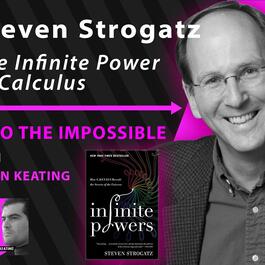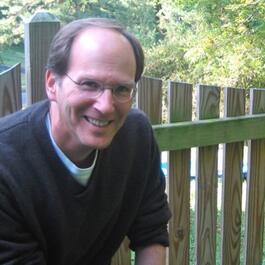
Steven Strogatz: The Infinite Power of Calculus
Steven Strogatz is the Jacob Gould Schurman Professor of Applied Mathematics at Cornell University. Early in his career, he worked on a variety of problems in mathematical biology, including the geometry of supercoiled DNA, the dynamics of the human sleep-wake cycle, the topology of three-dimensional chemical waves, and the collective behavior of biological oscillators, such as swarms of synchronously flashing fireflies. In the 1990s, his work focused on nonlinear dynamics and chaos applied to physics, engineering, and biology. Several of these projects dealt with coupled oscillators, such as lasers, superconducting Josephson junctions, and crickets that chirp in unison. In the past few years, this has led him into such topics as the role of crowd synchronization in the wobbling of London’s Millennium Bridge on its opening day, and the dynamics of structural balance in social systems. His best-known research contribution is his 1998 Nature paper on "small-world" networks, co-authored with his former student Duncan Watts. It's the sixth most highly cited paper—on any topic—in physics. Strogatz's writing includes five books. His book Sync was chosen as a Best Book of 2003 by Discover Magazine. His 2009 book The Calculus of Friendship was called "a genuine tearjerker" and "part biography, part autobiography and part off-the-beaten-path guide to calculus". His 2012 book, The Joy of x, won the 2014 Euler Book Prize. His latest book is Infinite Powers. http://www.stevenstrogatz.com/ Thanks to our sponsors! https://magbreakthrough.com/impossible http://betterhelp.com/impossible 00:00:00 Intro 00:03:20 Who was Herman Wouk and why do you start you book with him? 00:08:38 Should we train mathematicians to be good communicators? 00:16:19 On the significance of time, and the entropy of happiness. Is time the emotional dimension? 00:17:51 Small world theory, and one of the most cited papers of all time. 00:21:30 The thermodynamics of happiness and family size. 00:30:10 Can anyone understand infinity? 00:46:33 Are we becoming too connected? 00:53:44 What do you think about the idea that God in science? 00:57:03 The history of science! Carefully. 01:08:22 Intuition first, rigor later. 01:13:21 Is string theory to beautiful to be wrong? 01:17:12 Final Thrilling Three: Ethical Will, Billion Year Monument, Advice to your younger self. Join this channel to get access to perks: https://www.youtube.com/channel/UCmXH_moPhfkqCk6S3b9RWuw/join Support the podcast: https://www.patreon.com/drbriankeating And please join my mailing list to get resources and enter giveaways to win a FREE copy of my book (and more) http://briankeating.com/mailing_list.php 📝 🎥 🎥 Watch my most popular videos🎥 🎥 Frank Wilczek https://youtu.be/3z8RqKMQHe0?sub_confirmation=1 Weinstein and Wolfram https://www.youtube.com/watch?v=OI0AZ4Y4Ip4?sub_confirmation=1 Sheldon Glashow: https://youtu.be/a0_iaWgxQtA?sub_confirmation=1 Michael Saylor The Physics of Bitcoin https://youtu.be/CaN_CDKqXOg?sub_confirmation=1 Sir Roger Penrose, Nobel Prize winner: https://www.youtube.com/watch?v=AMuqyAvX7Wo?sub_confirmation=1 🏄♂️ Find me on Twitter at https://twitter.com/DrBrianKeating 🔥 Find me on Instagram at https://instagram.com/DrBrianKeating 📖 Buy my book LOSING THE NOBEL PRIZE: http://amzn.to/2sa5UpA 🔔 Subscribe for more great content https://www.youtube.com/DrBrianKeating?sub_confirmation=1 ✍️Detailed Blog posts here: https://briankeating.com/blog.php 📧Join my mailing list: http://briankeating.com/mailing_list.php 👪Join my Facebook Group: https://facebook.com/losingthenobelprize 🎙️Please subscribe, rate, and review the INTO THE IMPOSSIBLE Podcast on iTunes: https://itunes.apple.com/us/podcast/into-the-impossible/id1169885840?mt=2 🎙️Listen on all other platforms: https://wavve.link/into A production of http://imagination.ucsd.edu/ Support the podcast: https://www.patreon.com/drbriankeating Learn more about your ad choices. Visit megaphone.fm/adchoices
From "Into the Impossible With Brian Keating"




Comments
Add comment Feedback